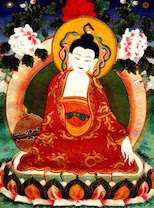Koso Wasan 9
All the bodhisattvas state:
'When we were in the causal stage,
We passed through countless kalpas
Performing the myriad good accts and practices,
On Wasting Time

This verse, like the one before it, is based on an idea drawn from Tao-cho's Anrakushu and it is very unlikely to be referring to the authentic and genuine practice of the dharma, which is not a waste of time. In the Kyo Gyo Shin Sho we discover that Shinran Shonin considers other schools of dharma, which advocate various practices, to be authentic. However, the passage in the Arakushu that is being referred to here alludes to æons spent blindly practicing abuse of the teaching - especially prajna.
Abuse of the dharma is, amongst other things, use of the dharma in a way that bolsters one's ego and sets oneself against others. It is using the dharma in an angry way because it is characterised by an attempt to isolate oneself from the realities with which all existence is imbued - 'not-self', 'change' and 'suffering' (anatman, anitya and dhukkha).
So it is not waste in the sense of time slipping away unused that is intended here but activity which is in itself futile. It is also not suggesting that the bodhisattvas have been using time in the wrong way by performing the practices required of the bodhisattva way, but that they have been using it for the wrong reason; that is to say, their use of time has been blind and ignorant. Instead of being used for growth, nuture and development it has been frittered away - as we can see from the language in the source passage in the Anrakushu - in unthinking ways characterised by habit. It was not until they were prepared to break out of habitual patterns and open their hearts (in this case) to the nembutsu, that they were able to progress to the stage of non-retrogression.
The Buddha Dharma views the manifold sphere of existence as a living, inter-dependent organism - always in a state of flux. That 'all things change' is a proposition that is fundamental to the dharma. Any attempt to subvert this underlying truth - or any lapse into habitual behaviour - is to slip outside the realm of reality. A living organism constantly changes, sometimes growing and sometimes declining, sometimes for good and sometimes for evil.
Teachings which seek to resist change are, in fact, simply false. The dharma used in this way is abuse because it is an attempt to buffer ourselves from change and to isolate ourselves from the realities which surround us and impact upon us in our daily lives. The way to waste time is to live entirely habitually or in ways that attempt subvert change.
You may be tempted to think that, having discovered the nembutsu way and attained adamantine shinjin (kongoshin), you have reached a stasis, a goal and a final objective. However, this is absolutely not the case. You may have entered the stage of non-retrogression but the Buddha way is not finished for any of us until 'the boundless sea of birth and death has been exhausted'. We may even attain Enlightenment but that is just the beginning, we now have the responsibility of teaching and enlightening others.
At a more mundane level, those who have accepted the nembutsu have not truly done so if they see it as the end of their endevours. The very need to grow, learn and adapt to the ever-changing movements of thought and the way we engage with and communicate with each other, only becomes more profound and more urgent - because it is natural that we would want to teach others and assist them also to find the way to final release. We can see from Shinran's experience that Amida's faith, once received, signals the begining of new a spiritual and intellectual growth cycle.
Wasting time is attempting to resist its passing; refusing to respond to change.